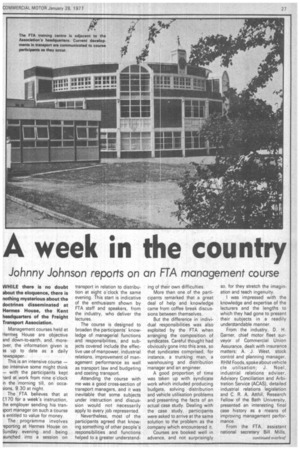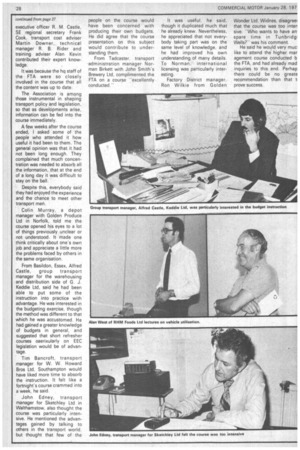A week in the country
Page 31

Page 32

If you've noticed an error in this article please click here to report it so we can fix it.
Johnny Johnson reports on an FTA management course
1/1/H1LE there is no doubt about the eloquence, there is nothing mysterious about the doctrines disseminated at Hermes House, the Kent headquarters of the Freight Transport Association.
Management courses held at Hermes House are objective and down-to-earth, and, moreover, the information given is as up to date as a daily newspaper.
This is an intensive course — too intensive some might think — with the participants kept -lard at work from nine o'clock in the morning till, on occasions, 9.30 at night
The FTA believes that at E170 for a week's instruction, the employer sending his transport manager on such a course s entitled to value for money.
The programme involves -eporting at Hermes House on Sunday evening and being aunched into a session on transport in relation to distribution at eight o'clock the same evening. This start is indicative of the enthusiasm shown by FTA staff and speakers, from the industry, who deliver the lectures.
The course is designed to broaden the participants' knowledge of managerial functions and responsibilities, and subjects covered include the effective use of manpower, industrial relations, improvement of management performance as well as transport law and budgeting and costing transport.
Attending the course with me was a good cross-section of transport managers, and it was inevitable that some subjects under instruction and discussion would not necessarily apply to every job represented.
Nevertheless, most of the participants agreed that knowing something of other people's responsibilities and functions helped to a greater understand ing of their own difficulties.
More than one of the participants remarked that a great deal of help and knowledge came from coffee break discussions between themselves.
But the difference in individual responsibilities was also exploited by the FTA when arranging the composition of syndicates. Careful thought had obviously gone into this area, so that syndicates comprised, for instance, a trunking man, a warehousing and distribution manager and an engineer.
A good proportion. of time was taken up with syndicate work which included producing budgets, solving distribution and vehicle utilisation problems and presenting the facts of an actual case study. Dealing with the case study, participants were asked to arrive at the same solution to the problem as the company which encountered it.
Courses are booked well in advance, and not surprisingly so, for they stretch the imagination and teach ingenuity.
I was impressed with the knowledge and expertise of the lecturers and the lengths to which they had gone to present their subjects in a readily understandable manner.
From the industry, D. H. Garner, chief motor fleet surveyor of Commercial Union Assurance, dealt with insurance matters; A. J. West, stock control and planning manager, RHM Foods, spoke about vehicle cle utilisation; J. Noel, industrial relations adviser, Advisory Conciliation and Arbitration Service (ACAS), detailed industrial relations legislation and C. R. A. Atthil, Research Fellow of the Bath University, presented an interesting final case history as a means of improving management performance.
From the FTA, assistant national secretary Bill Mills, continued overleaf executive officer R. M. Castle, SE regional secretary Frank Cook, transport cost adviser Martin Downer, technical manager R. B. Rider and training adviser Alan Kevin contributed their expert knowledge.
it was because the hq staff of the FTA were so closely involved in the course that all the content was up to date.
The Association is among those instrumental in shaping transport policy and legislation, so that as developments arise, information can be fed into the course immediately.
A few weeks after the course ended, I asked some of the people who attended it how useful it had been to them, The general opinion was that it had not been long enough. They complained that much concentration was needed to absorb all the information, that at the end of a long day it was difficult to stay on the ball.
Despite this, everybody said they had enjoyed the experience and the chance to meet other transport men.
Colin Murray, a depot manager with Golden Produce Ltd in Norfolk, told me the course opened his eyes to a lot of things previously unclear or not understood. It made one think critically about one's own job and appreciate a little more the problems faced by others in the same organisation.
From Basildon, Essex, Alfred Castle, group transport manager for the warehousing and distribution side of G. J Keddie Ltd, said he had been able to put some of the instruction into practice with advantage. He was interested in the budgeting exercise, though the method was different to that which he was accustomed. He had gained a greater knowledge of budgets in general, and suggested that short refresher courses oaerixularly on EEC legislation would be of advantage.
Tim Bancroft, transport manager for W. W. Howard Bros Ltd, Southampton would have liked more time to absorb the •instruction. It felt like a fortnight's course crammed into a week, he said.
John Edney, transport manager for Sketchley Ltd in Waltharnstow, also thought the course was particularly intensive. He mentioned the advantages gained by talking to others in the transport world, but thought that few of the people on the course would have been concerned with producing their own budgets. He did agree that the course presentation on this subject would contribute to understanding them.
From Tadcaster. transport -administration manager Norman Birkett with John Smith's Brewery Ltd, complimented the ETA on a course l'excellently conducted."
It was useful, he said, though it duplicated much that he already knew. Nevertheless, he appreciated that not everybody taking part was on the same level of knowledge, and he had improved his own understanding of many details. To Norman, international licensing was particularly interesting.
Factory District manager, Ron Wilkie from Golden
Wonder Ltd, Widnes, disagree( that the course was too inten sive. "Who wants to have an. spare time in Tunbridg, Wells?" was his comment.
He said he would very mud like to attend the higher mar agement course conducted b the FTA, and had already mad inquiries to this end. Perhap there could be no g reate recommendation than that t, prove success.


































































































